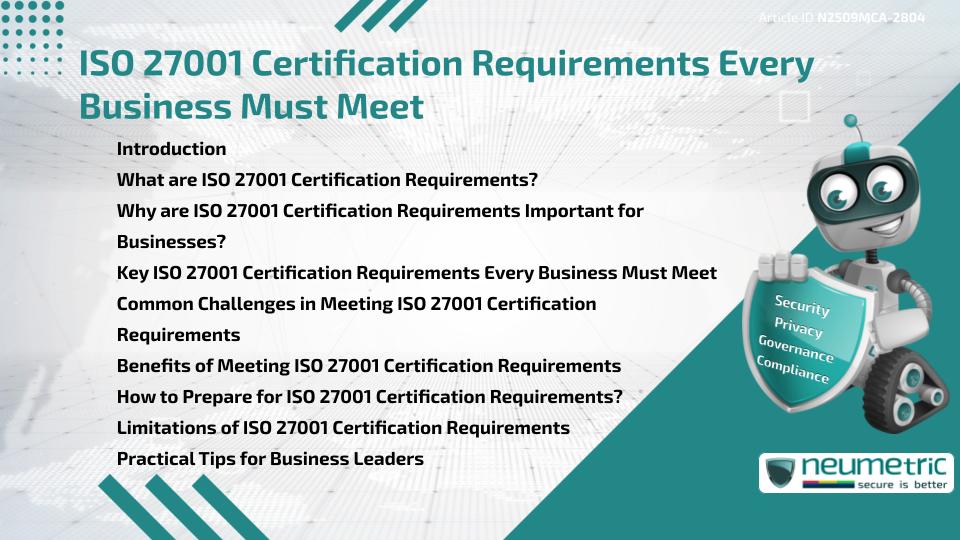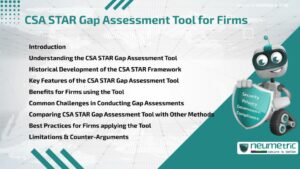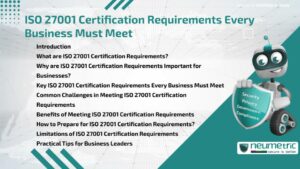Table of Contents
ToggleIntroduction
The ISO 27001 Certification requirements set the global benchmark for establishing, implementing & maintaining an effective Information Security Management System [ISMS]. Businesses seeking Certification must demonstrate that they have robust Security Controls, Risk Management practices & Governance structures in place. Meeting these requirements is critical for protecting Sensitive Data, achieving Regulatory Compliance & building Customer Trust. This article explores what the ISO 27001 Certification requirements are, why they matter, the challenges businesses face & practical tips for leaders preparing for certification.
What are ISO 27001 Certification Requirements?
The ISO 27001 Certification requirements are a set of standards published by the International organisation for Standardization [ISO] and the International Electrotechnical Commission [IEC]. They define the criteria for creating an ISMS-a structured Framework to manage Information Security Risks.
Certification requires independent Auditors to verify that the organisation has documented Policies, implemented controls & continuously monitors & improves its security practices.
Why are ISO 27001 Certification Requirements Important for Businesses?
Businesses today face growing Threats such as cyberattacks, insider Risks & data breaches. Meeting ISO 27001 Certification requirements demonstrates to clients, regulators & partners that an organisation takes Information Security seriously.
Beyond trust, certification often provides access to new markets, supports Regulatory Compliance & can be a contractual requirement in industries like Finance, Healthcare & technology.
Key ISO 27001 Certification Requirements Every Business Must Meet
The ISO 27001 Certification requirements cover a wide range of areas, including:
- Context of the Organisation: Understanding internal & external issues affecting security.
- Leadership & Commitment: Top Management must demonstrate accountability for ISMS success.
- Risk Assessment & Treatment: Identifying & addressing Information Security Risks.
- Information Security Policy: Defining objectives & guidelines for Data Protection.
- Competence & Awareness: Ensuring staff are trained in security practices.
- Documented Information: Maintaining Policies, procedures & Evidence of compliance.
- Internal Audits: Regularly reviewing ISMS performance.
- Management Review: Leadership evaluating ISMS effectiveness.
- Continual Improvement: Demonstrating that processes evolve with emerging Risks.
These elements are supported by Annex A, which includes one hundred fourteen (114) controls grouped under categories such as Access Control, cryptography, physical security & supplier management.
Common Challenges in Meeting ISO 27001 Certification Requirements
Organisations often struggle with:
- Lack of clarity around documentation requirements.
- Limited resources or expertise to implement controls.
- Resistance to change among Employees.
- Overlooking Vendor & Third Party Risks.
- Difficulty maintaining continuous compliance after certification.
Recognizing these challenges early allows leaders to allocate resources effectively.
Benefits of Meeting ISO 27001 Certification Requirements
Achieving Certification offers numerous advantages:
- Builds trust & credibility with Clients & Partners.
- Strengthens protection against Cyber Threats.
- Enhances compliance with regulations such as GDPR or HIPAA.
- Improves internal Governance & accountability.
- Opens opportunities in global markets where Certification is expected.
How to Prepare for ISO 27001 Certification Requirements?
Businesses can prepare by:
- Conducting a gap Assessment to identify missing controls.
- Engaging leadership to champion the ISMS.
- Training Employees on roles & responsibilities.
- Documenting Policies & procedures thoroughly.
- Performing internal audits before the external Assessment.
Working with consultants or leveraging compliance automation tools can also accelerate readiness.
Limitations of ISO 27001 Certification Requirements
While Certification is valuable, it is not a guarantee of absolute security. The ISO 27001 Certification requirements focus on Risk Management, but effectiveness depends on implementation & Continuous Monitoring. Additionally, certification can be resource-intensive, making it challenging for smaller businesses without adequate support.
Practical Tips for Business Leaders
- Secure executive sponsorship from the start.
- Align Certification with broader business goals.
- Involve cross-functional teams in ISMS design.
- Treat Certification as a long-term commitment, not a one-time project.
- Regularly update Policies & controls as Risks evolve.
Takeaways
- Define the global benchmark for ISMS implementation.
- Strengthen security, compliance & market credibility.
- Require leadership involvement & Continuous Improvement.
- Pose challenges around resources & documentation.
- Provide long-term trust & competitive advantage.
FAQ
What are ISO 27001 Certification requirements?
They are a set of standards for establishing & maintaining an ISMS to protect Information Security.
Who needs to meet ISO 27001 Certification requirements?
Any organisation that processes Sensitive Data or wants to demonstrate strong security practices can benefit.
What is Annex A in ISO 27001 Certification requirements?
Annex A lists one hundred fourteen (114) controls that Organisations can apply to address specific Risks.
How long does it take to meet ISO 27001 Certification requirements?
It can take several months to more than a year depending on the organisation’s size & maturity.
Is ISO 27001 Certification mandatory?
No, but it is often required by regulators or clients in data-sensitive industries.
What are the biggest challenges in achieving certification?
Common challenges include documentation, Employee resistance & ongoing compliance maintenance.
How does meeting ISO 27001 Certification requirements benefit businesses?
It enhances trust, strengthens security, supports compliance & opens new business opportunities.
Need help for Security, Privacy, Governance & VAPT?
Neumetric provides organisations the necessary help to achieve their Cybersecurity, Compliance, Governance, Privacy, Certifications & Pentesting needs.
Organisations & Businesses, specifically those which provide SaaS & AI Solutions in the Fintech, BFSI & other regulated sectors, usually need a Cybersecurity Partner for meeting & maintaining the ongoing Security & Privacy needs & requirements of their Enterprise Clients & Privacy conscious Customers.
SOC 2, ISO 27001, ISO 42001, NIST, HIPAA, HECVAT, EU GDPR are some of the Frameworks that are served by Fusion – a SaaS, multimodular, multitenant, centralised, automated, Cybersecurity & Compliance Management system.
Neumetric also provides Expert Services for technical security which covers VAPT for Web Applications, APIs, iOS & Android Mobile Apps, Security Testing for AWS & other Cloud Environments & Cloud Infrastructure & other similar scopes.
Reach out to us by Email or filling out the Contact Form…





